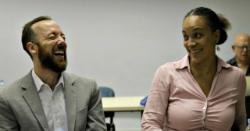"Around the College" is no longer being updated.
View current SUNY Empire Stories.
July 27, 2017
SUNY Empire Faculty Advance Innovative, Virtual International Student “Exchange” Program

SUNY Empire State College faculty and professional staff participated in the recent SUNY Center for Collaborative Online International Learning (SUNY COIL)’s intensive five-day workshop at the American University in Technology (AUT), Beirut, Lebanon, one of the college’s eight international education partners.
The SUNY COIL workshop is one of the initiatives made possible by a $506,000 grant from The Aspen Institute’s Stevens Initiative, which funds an innovative, SUNY-wide program of outreach and virtual student exchange with universities across the Middle East/North Africa (MENA) region.
“Engagement in the Stevens Institute-supported SUNY COIL initiative renews our commitment to one of SUNY Empire’s core values; innovative, cross-cultural learning should be accessible to all,” said Francesca Cichello, the college’s newly appointed executive director of international education.
At the workshop, 15 faculty members representing several SUNY colleges paired with a faculty member from the American University of Cairo, New Cairo, Egypt, Université Mohamed Premier Oujda, Oujda, Morocco or AUT.
The faculty pairs shared ideas and developed learning opportunities for their international collaboration between students in SUNY and institutions of higher education in MENA regions.
The international learning exchange will be part of a selected fall 2017 term course.
Andrew Hashey, an assistant professor with SUNY Old Westbury’s Department of Exceptional Education and Learning, and SUNY Empire Associate Professor Rhianna Rogers are collaborating on a project.
Among her many other academic responsibilities, Rogers teaches with the college’s Beirut, Lebanon Residency Program.
SUNY Empire and AUT students enrolled in her course, "Digital Culture and Society," will collaborate with a group of Hashey’s students enrolled in his graduate course, “Exceptional Learning,” during a four- to six-week module, “Learning Effectively in a Digital Age,” which is built on a Google site.
“Both Dr. Hashey and I hope to use our work together in SUNY COIL to show students ‘real-world’ successes and failures in on- and off-line communication across cultures,” said Rogers. “We hope to provide students with resources and strategies to help them critically think about cultures other than their own, and mitigate expected and unexpected issues in international group settings.”
Like all of its international students, SUNY Empire students enrolled in the Lebanon residency, offered in cooperation with AUT and American University of Science and Technology (AUST), Beirut, remain in their country of origin and complete a SUNY Empire degree online, face-to-face and through a blend of both.
As part of the workshop, SUNY Empire Professor Susan Oaks and Assistant Professor Jeannine Mercer, the college’s academic program director for the Lebanon residency, discussed the expectations, reality and cultural perceptions of their students during their collaboration in the fall 2016 term.
Oaks and Mercer explained how they altered assignments and group collaborative work based on students' interactions, comfort level and access to certain media tools, as well as their ability to interact with someone from a different culture and, in this case, a different generation.
For the most part, SUNY Empire students living and learning in New York state tended to be independent, working adults – the average age of a SUNY Empire undergraduate student is 35 – and learned in an online setting. Students in Lebanon were of a traditional age and learned in classrooms.
Oaks and Mercer noted student perceptions, which came up during the collaborative learning. For example, they said that Lebanese students remarked how American students socialize through their work because they do not have time for a social life, and American students remarked on how important family values are to the Lebanese.
About the Stevens Initiative
Named for former U.S. Ambassador J. Christopher Stevens, the Stevens Initiative is an international effort to build global competence for young people in the U.S., the Middle East and North Africa by growing and enhancing the field of virtual exchange through online, international and collaborative learning.
Stevens devoted his life to building bridges. As a young man, he volunteered to join the Peace Corps and taught English in the Atlas Mountains of Morocco.
He served the majority of his career in North Africa and the Middle East.
In September 2012, extremists killed Stevens while he was serving as U.S. ambassador to Libya.
